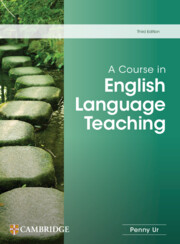Book contents
- Frontmatter
- Contents
- Acknowledgements
- Introduction
- 1 Teaching English today
- 2 The lesson
- 3 Classroom interaction
- 4 Tasks
- 5 Texts
- 6 Teaching vocabulary
- 7 Teaching grammar
- 8 Teaching listening
- 9 Teaching speaking
- 10 Teaching reading
- 11 Teaching writing
- 12 Feedback and error correction
- 13 Assessment and testing
- 14 The syllabus
- 15 Teaching/learning materials
- 16 Teaching content
- 17 Classroom discipline
- 18 Digital technology and online teaching
- 19 Learner differences 1: age
- 20 Learner differences 2: diversity and inclusion
- 21 Teacher development
- Glossary
- References
- Index
- Frontmatter
- Contents
- Acknowledgements
- Introduction
- 1 Teaching English today
- 2 The lesson
- 3 Classroom interaction
- 4 Tasks
- 5 Texts
- 6 Teaching vocabulary
- 7 Teaching grammar
- 8 Teaching listening
- 9 Teaching speaking
- 10 Teaching reading
- 11 Teaching writing
- 12 Feedback and error correction
- 13 Assessment and testing
- 14 The syllabus
- 15 Teaching/learning materials
- 16 Teaching content
- 17 Classroom discipline
- 18 Digital technology and online teaching
- 19 Learner differences 1: age
- 20 Learner differences 2: diversity and inclusion
- 21 Teacher development
- Glossary
- References
- Index
Summary
How do we read?
In this chapter, I am taking the word reading to mean ‘reading and understanding’. A learner who says, ‘I can read the words on the page, but I don't know what they mean’ is, therefore, not reading, in this sense, but only decoding: translating the written symbols into their corresponding sounds.
In this section, I aim to clarify some aspects of the nature of reading by critically examining some generally accepted assumptions expressed in the following statements.
1 We need to decode individual letters in order to read words; and we need to read and understand all the words accurately in order to understand a text.
2 If we understand all the words in a text, we will understand the text.
3 The more words there are in a text, the longer it will take to read it.
We’ll examine these assumptions in the three Pause for thought tasks on the next two pages.
Pause for thought
Read the following text as quickly as you can:
The handsome knight mounted his horse and galloped off to save the beautiful princess. On and on, over mountains and valleys, until his galloping house was exhausted. At last he dismounted … Where was the dragon?
Did you understand it?
Comment
Did you notice that the second time the word horse appeared, it was spelt ‘house’? If you did not, this does not mean that you are a bad reader, but rather the reverse: you are a good reader, in the sense that you are looking for meanings, and aiming to understand the overall sense of the text. We have a natural tendency to try to make anything we read meaningful to us. If a particular word is irrelevant or misspelt, we tend to overlook any aberrations: to interpret it, as here, in a way which accords with the overall message of the text. So we don't just decode all the letters, or read every word accurately
- Type
- Chapter
- Information
- A Course in English Language Teaching , pp. 128 - 145Publisher: Cambridge University PressPrint publication year: 2024

